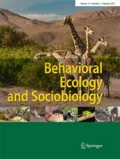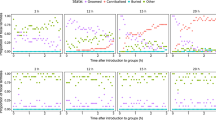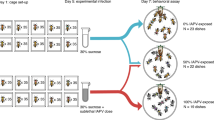Abstract
The benefit of sociality in relation to disease susceptibility was studied in the dampwood termite Zootermopsis angusticollis. Although contact with high concentrations of fungal conidia is lethal, the survivorship of nymphs exposed to spore suspensions ranging from 6 × 106 to 2 × 108 spores/ml of the fungus Metarhizium anisopliae increased with group size. The survivorship (measured as LT50) of isolated individuals ranged from 3.0 to 4.8 days, but infected nymphs living in groups of 10 and 25 individuals survived significantly longer (5.6–8.3 and 5.6–9.1 days, respectively). In most cases, there were no significant differences in the survival distributions of the 10- and 25-termite groups. When nymphs were infected with concentrations of 7 × 101–7 × 104 spores/ml and allowed to interact with healthy nestmates, fungal infections were not contracted by the unexposed termites. Moreover, infected termites benefitted from social contact with unexposed nestmates: their survival rates were significantly higher than those of infected termites living with similarly infected nestmates. Allogrooming, which increased in frequency during and after exposure to conidia, appeared to remove potentially infectious spores from the cuticle, thus increasing termite survivorship. These results suggest that allogrooming plays a crucial role in the control of disease and its death hazard in termites. The infection-reducing advantage of group living may have been significant in the evolution of social behavior in the Isoptera.
Similar content being viewed by others
Author information
Authors and Affiliations
Additional information
Received: 18 March 1998 / Accepted after revision: 31 May 1998
Rights and permissions
About this article
Cite this article
Rosengaus, R., Maxmen, A., Coates, L. et al. Disease resistance: a benefit of sociality in the dampwood termite Zootermopsis angusticollis (Isoptera: Termopsidae). Behav Ecol Sociobiol 44, 125–134 (1998). https://doi.org/10.1007/s002650050523
Issue Date:
DOI: https://doi.org/10.1007/s002650050523




